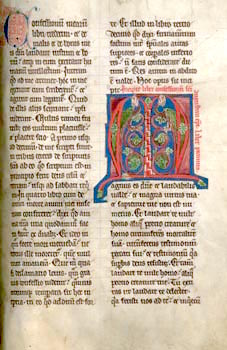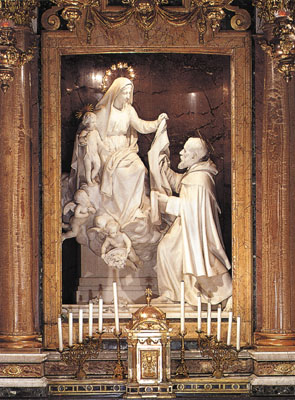
Augustine of Hippo, also known as Saint Augustine, was a theologian and philosopher of Berber origin and the bishop of Hippo Regius in Numidia, Roman North Africa. His writings influenced the development of Western philosophy and Western Christianity, and he is viewed as one of the most important Church Fathers of the Latin Church in the Patristic Period. His many important works include The City of God, On Christian Doctrine, and Confessions.
Celibacy is the state of voluntarily being unmarried, sexually abstinent, or both, usually for religious reasons. It is often in association with the role of a religious official or devotee. In its narrow sense, the term celibacy is applied only to those for whom the unmarried state is the result of a sacred vow, act of renunciation, or religious conviction. In a wider sense, it is commonly understood to only mean abstinence from sexual activity.

In Christian belief, a saint is a person who is recognized as having an exceptional degree of holiness, likeness, or closeness to God. However, the use of the term saint depends on the context and denomination. In Catholic, Eastern Orthodox, Anglican, Oriental Orthodox, and Lutheran doctrine, all of their faithful deceased in Heaven are considered to be saints, but some are considered worthy of greater honor or emulation. Official ecclesiastical recognition, and consequently a public cult of veneration, is conferred on some denominational saints through the process of canonization in the Catholic Church or glorification in the Eastern Orthodox Church after their approval.

The Declaration of Independence, formally titled The unanimous Declaration of the thirteen united States of America, is the founding document of the United States. On July 4, 1776, it was adopted unanimously by the 56 delegates to the Second Continental Congress, who had convened at the Pennsylvania State House, later renamed Independence Hall, in the colonial era capital of Philadelphia. The declaration explains to the world why the Thirteen Colonies regarded themselves as independent sovereign states no longer subject to British colonial rule.
Andrew M. Greeley was an American Catholic priest, sociologist, journalist and popular novelist. He was a professor of sociology at the University of Arizona and the University of Chicago, and a research associate with the National Opinion Research Center (NORC).

Confessions is an autobiographical work by Augustine of Hippo, consisting of 13 books written in Latin between AD 397 and 400. The work outlines Augustine's sinful youth and his conversion to Christianity. Modern English translations of it are sometimes published under the title The Confessions of Saint Augustine in order to distinguish the book from other books with similar titles. Its original title was Confessions in Thirteen Books, and it was composed to be read out loud with each book being a complete unit.
Semi-Pelagianism is a historical Christian theological and soteriological school of thought about the role of free will in salvation. In semipelagian thought, a distinction is made between the beginning of faith and the increase of faith. Semi-Pelagian thought teaches that the latter half – growing in faith – is the work of God, while the beginning of faith is an act of free will, with grace supervening only later.

Mercy is benevolence, forgiveness, and kindness in a variety of ethical, religious, social, and legal contexts.

Joseph Pearce, is an English-born American writer, and as of 2014 Director of the Center for Faith and Culture at Aquinas College in Nashville, Tennessee, before which he held positions at Thomas More College of Liberal Arts in Merrimack, New Hampshire, Ave Maria College in Ypsilanti, Michigan and Ave Maria University in Ave Maria, Florida.

Scott Walker Hahn is an American Catholic theologian and Christian apologist. A former Protestant, Hahn was a Presbyterian minister who converted to Catholicism. Hahn's popular works include Rome Sweet Home and The Lamb's Supper: The Mass as Heaven on Earth. His lectures have been featured in multiple audio distributions through Lighthouse Catholic Media. Hahn is known for his research on Early Christianity during the Apostolic Age and various theoretical works concerning the early Church Fathers.

John Cassian, also known as John the Ascetic and John Cassian the Roman, was a Christian monk and theologian celebrated in both the Western and Eastern churches for his mystical writings. Cassian is noted for his role in bringing the ideas and practices of early Christian monasticism to the medieval West.

Garry Wills is an American author, journalist, political philosopher, and historian, specializing in American history, politics, and religion, especially the history of the Catholic Church. He won a Pulitzer Prize for General Non-Fiction in 1993.

Richard Brookhiser is an American journalist, biographer and historian. He is a senior editor at National Review. He is most widely known for a series of biographies of America's founders, including Alexander Hamilton, Gouverneur Morris, and George Washington.

William J. Broad is an American science journalist, author and a Senior Writer at The New York Times.

Christianity is the most prevalent religion in the United States. Estimates from 2021 suggest that of the entire U.S. population about 63% is Christian. The majority of Christian Americans are Protestant Christians, though there are also significant numbers of American Roman Catholics and other Christian denominations such as Latter Day Saints, Eastern Orthodox Christians and Oriental Orthodox Christians, and Jehovah's Witnesses. The United States has the largest Christian population in the world and, more specifically, the largest Protestant population in the world, with nearly 210 million Christians and, as of 2021, over 140 million people affiliated with Protestant churches, although other countries have higher percentages of Christians among their populations. The Public Religion Research Institute's "2020 Census of American Religion", carried out between 2014 and 2020, showed that 70% of Americans identified as Christian during this seven-year interval. In a 2020 survey by the Pew Research Center, 65% of adults in the United States identified themselves as Christians. They were 75% in 2015, 70.6% in 2014, 78% in 2012, 81.6% in 2001, and 85% in 1990. About 62% of those polled claim to be members of a church congregation.

The exact origins of both the rosary and scapular are subject to debate among scholars. Pious tradition maintains that both the rosary and the brown Scapular of Our Lady of Mount Carmel were given by the Virgin Mary to Dominic and Simon Stock respectively during the 13th century. Historical records document their growth during the 16th and 17th centuries in Europe. By the early 20th century, they had gained such a strong following among Catholics worldwide that Josef Hilgers, writing in the Catholic Encyclopedia of 1914, stated: "Like the Rosary, the Brown scapular has become the badge of the devout Catholic."
Alma Luz Villanueva is an American poet, short story writer, and novelist.

A sacrament is a Christian rite that is recognized as being particularly important and significant. There are various views on the existence, number and meaning of such rites. Many Christians consider the sacraments to be a visible symbol of the reality of God, as well as a channel for God's grace. Many denominations, including the Roman Catholic, Lutheran, Presbyterian, Anglican, Methodist, and Reformed, hold to the definition of sacrament formulated by Augustine of Hippo: an outward sign of an inward grace, that has been instituted by Jesus Christ. Sacraments signify God's grace in a way that is outwardly observable to the participant.
Propaganda in Fascist Italy was used by the National Fascist Party in the years leading up to and during Benito Mussolini's leadership of the Kingdom of Italy from 1922 to 1943, and was a crucial instrument for acquiring and maintaining power and the implementation of Fascist policies.

Augustinianism is the philosophical and theological system of Augustine of Hippo and its subsequent development by other thinkers, notably Boethius, Anselm of Canterbury and Bonaventure. Among Augustine's most important works are The City of God, De doctrina Christiana, and Confessions.













